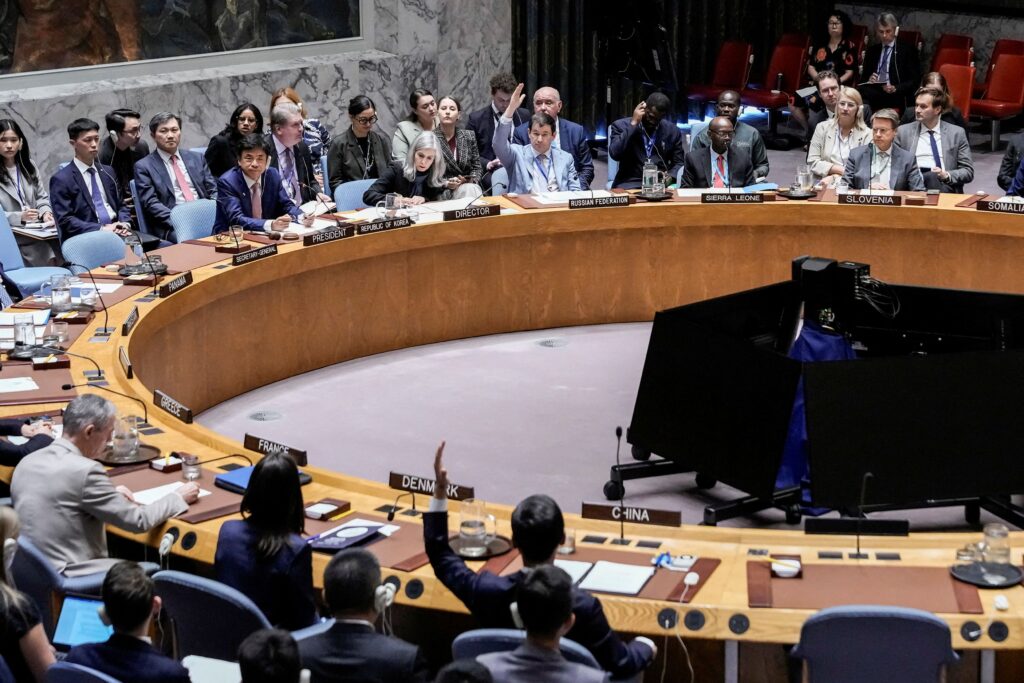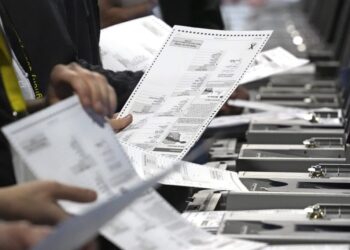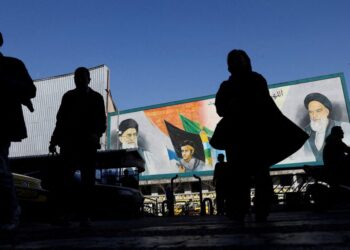A U.S.-drafted U.N. resolution endorsing President Donald Trump’s Gaza peace plan passed overwhelmingly in the Security Council on Monday, a major victory for administration diplomacy as it struggles to implement its blueprint for what Trump has said would be “a new dawn” for the Middle East.
The resolution provides a legal mandate for key parts of the plan, including persuading other countries to provide troops for an International Security Force that will take over security in the half of Gaza from which Israel has withdrawn.
In a statement after the vote, U.S. ambassador to the U.N. Michael Waltz expressed thanks to the members “for joining us in charting a new course in the Middle East for the Israelis and Palestinians and all the people in the region.”
It demonstrates, he said, “the overwhelming support for the president’s vision.”
The views of many of the 15 council members had remained unclear during a week of tense negotiations leading up to the vote, with many demanding more clarity on the peace plan that Trump first introduced in late September, including an early role for the Palestinian Authority in rebuilding Gaza and a firmer commitment to an eventual Palestinian state.
In the end, 13 voted in favor and none against.
Russia and China abstained.
Several countries that voted in favor said in remarks following the vote that they still sought those commitments and would be watching carefully to see progress.
Hamas, in a statement, said the resolution “does not meet the level” of Palestinian political and humanitarian demands.
“It imposes a mechanism to achieve the [Israeli] occupation’s objectives,” the group said.
Turning in their weapons, as the peace plan demands, Hamas said, “must remain an internal national matter” tied to the end of the Israeli occupation.
Israeli Ambassador Danny Danon attended the meeting but did not speak. Prime Minister Benjamin Netanyahu has repeatedly said Israel would never agree to the establishment of a Palestinian state.
Algeria’s delegation, representing Arab countries, expressed “thanks to U.S. leadership and in particular to President Trump, whose personal engagement has been instrumental” in obtaining the ceasefire.
“But we underline that genuine peace in the Middle East cannot, cannot be achieved without justice … for the Palestinian people who have waited for decades for the establishment of their independent state,” Algerian Ambassador Amar Bendjama said following the vote.
Other diplomats in attendance said that while some of the concerns they expressed to the Americans were not incorporated in the resolution, they were persuaded to approve it after seeing support from Arab nations. “The perfect is the enemy of the good,” Panama’s representative said. “We reiterate that the only sustainable path … would allow the people of Palestine and Israel to live side by side in two states in peace, security and dignity.”
Despite objections within the Israeli government over the resolution’s language around Palestinian statehood, a statement from Netanyahu’s office Tuesday welcomed the approval of Trump’s plan. The statement called on neighboring countries to normalize relations with Israel and “join us in expelling Hamas and its supporters from the region.”
While initial elements of the plan — a ceasefire, the release of Israeli hostages held by Hamas and expansion of humanitarian aid to Gaza — have at least partially been carried out, the rest has been stalled.
The U.S.-sponsored resolution enshrines the complete plan in international law, establishing a vaguely defined Board of Peace, headed by Trump with membership chosen by him, that for two years will control virtually every aspect from security and governance to reconstruction of Gaza.
The resolution calls the board “a transitional administration with an international legal personality” that will supervise and support a Palestinian “technocratic” committee responsible for “day to day operations of Gaza’s civil service and administration.”
The board is authorized to establish “a temporary International Stabilization Force (ISF) in Gaza to deploy under unified command acceptable to the BoP.” According to the resolution, the ISF — working with a newly trained and vetted Palestinian police force — would help secure border areas, ensure the disarming of militant groups and “protect humanitarian operations” in “close coordination” with Egypt and Israel.
Waltz said that Indonesia and Azerbaijan have agreed to participate, and indicated other countries were expected to contribute troops and other resources to the force now that the U.N. has approved it.
“As the ISF establishes control and stability,” the resolution says, the Israel Defense Forces, which now controls slightly more than half of Gaza, will gradually withdraw, “save for a security perimeter presence.”
Quoting from Trump’s plan, which appears in full in an annex to the U.N. resolution, it says that once the West Bank-based Palestinian Authority has been reformed, it will take over governing authority in Gaza and “the conditions may finally be in place for a credible pathway to Palestinian self-determination and statehood.”
The United States, the plan says, “will establish a dialogue between Israel and the Palestinians to agree on a political horizon for peaceful and prosperous co-existence.”
The administration played hardball in the days leading to Monday’s vote. In anticipation of an alternative resolution proposed by Russia, the U.S. mission to the U.N. warned in a statement last week that “attempts to sow discord” would have “grave, tangible and entirely avoidable consequences for Palestinians in Gaza.”
Waltz wrote in a Friday opinion article in The Washington Post: “The Board of Peace is the only path to a secure Gaza in which Palestinians can determine their own destiny. … Any refusal to back this resolution is a vote either for the continued reign of Hamas terrorists or for the return to war with Israel.”
“Every departure from this path, be it by those who wish to play political games or to relitigate the past, will come with a real human cost,” Waltz wrote.
As the vote approached over the weekend, members of Netanyahu’s cabinet objected to even the hazy and indefinite commitment to a Palestinian state in the U.S. resolution.
“Israel’s policy is clear: There will be no Palestinian state,” Defense Minister Israel Katz said, calling on Netanyahu to make clear that it would not happen “in any form.”
“The only real solution for Gaza,” Katz said, “is encouraging voluntary emigration.”
National Security Minister Itamar Ben Gvir called on Netanyahu to “order the elimination of the Palestinian Authority, which are terrorists in every sense,” and order the arrest of its president, Mahmoud Abbas, if there was any movement toward a state.
At the opening of a cabinet meeting, Netanyahu restated his opposition to statehood, saying, “I don’t need anyone’s tweets, commentary or lectures.”
Abbie Cheeseman contributed to this report.
The post U.N. Security Council approves Trump’s 20-point peace plan for Gaza
appeared first on Washington Post.




